Key Essentials for Your First Apartment Setup
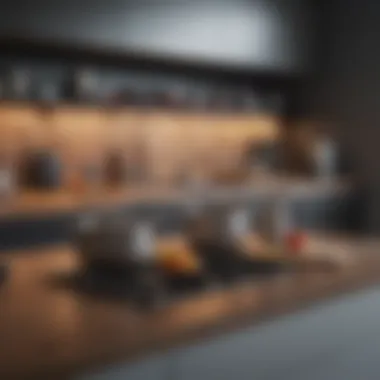
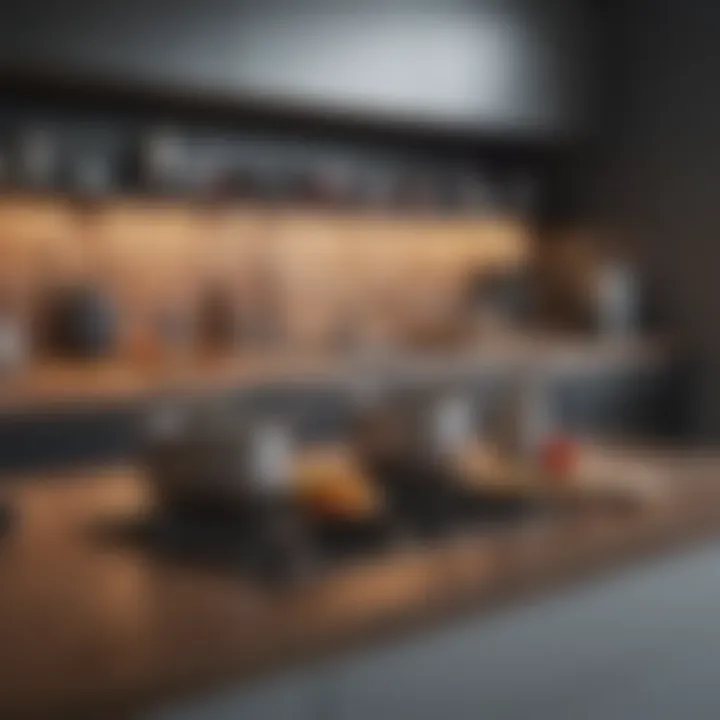
Intro
Moving into your first apartment? It can feel like stepping into a big, uncharted territory. Your new space, often a blank canvas, beckons for personal expression and functional living. You may be filled with excitement and a fair share of anxiety about what to buy and decorate. This transition represents not just a physical move, but a rite of passage into a new chapter of life. Your apartment should reflect who you are and cater to your needs, making it crucial to have a mindful approach toward selecting the essentials that will turn that shell into a sanctuary.
The road to creating your ideal living space can be unique and multifaceted. This article will guide you through various items necessary for a well-equipped apartment, covering everything from kitchen necessities to furniture considerations. By understanding the fundamental aspects, you’ll navigate the maze of your first independent living experience with greater confidence and ease.
Architectural Inspiration
Overview of Design Styles
Before diving into the nitty-gritty of what to buy, consider the overall aesthetic you want for your apartment. Various design styles, such as industrial, minimalist, bohemian, and Scandinavian, each offer distinct vibes and functionalities.
- Industrial: Raw materials, exposed pipelines, and a neutral color palette can create an urban feel. Think about metal furniture or brick wall finishes.
- Minimalist: Less is more here; functional and uncluttered, this style appeals to a clean and calm living space.
- Bohemian: For the free spirit! Layered textiles, vibrant colors, and a mix of patterns define this eclectic style.
- Scandinavian: Emphasizing simplicity and nature—white walls, warm wood tones, and natural light will make your space inviting.
When selecting furniture and decor, keeping in mind these styles can set the tone for the entire apartment and can impact how effectively the space functions.
Innovative Materials and Techniques
In addition to understanding styles, today’s trends lean toward sustainable and innovative materials. Choices like reclaimed wood, bamboo, and recycled metals not only contribute to a distinctive look but also align with a more eco-conscious lifestyle. These materials can offer durability while adding character to your home.
Moreover, techniques such as modular furniture increase versatility, allowing you to adapt your setup without a complete overhaul. For example, a modular sofa can shift shapes depending on your gathering needs—perfect for both cozy nights or entertaining guests.
Interior Design Trends
Color Schemes and Their Psychological Effects
Choosing the right colors can have a significant impact on your mood and your apartment's atmosphere. Colors are not just for visuals; they tell a story. Here are a few popular choices:
- Cool blues promote calmness and tranquility, ideal for bedrooms.
- Warm yellows energize spaces, making them great for kitchens or dining areas.
- Neutral tones provide a blank slate, allowing more flexibility in decor without overwhelming the senses.
It's beneficial to explore how shades work together in different lighting conditions.
Space Optimization Tips
In your first apartment, maximizing space is key, especially if you're dealing with a smaller layout. Here are some practical tips:
- Vertical storage: Utilize wall shelves to free up floor space.
- Multi-functional furniture: A bed with drawers or an ottoman that doubles as storage can enhance efficiency.
- Declutter regularly: Keep only the essentials to maintain a clean look that feels spacious.
As you embark on this journey of setting up your first apartment, remember that every item counts. In this phase of life where you create your personal haven, the right essentials will not only reflect your personality but also ease the transition into independent living.
"An apartment is not just a place, but a feeling, a vibe that echoes through every corner and every choice you make."
Whether you're just starting with a few essentials or decorating with a full vision in mind, take time to enjoy the process. After all, it's about creating a space that feels like home.
Understanding the Essentials
Moving into your first apartment can feel like stepping into a whole new world. It’s not just about having a roof over your head but creating a space that feels like home. This section emphasizes the importance of being methodical in your approach to furnishing and equipping your new living environment. When you take the time to understand the essentials, you set yourself up for a smoother transition and enhance your overall living experience.
The Importance of Smart Planning
Smart planning is the bedrock upon which a well-arranged apartment is built. It goes beyond mere aesthetics; it’s about functionality and comfort. Think of it this way: if you don’t plan out your layout or the items you need, you might end up with a crowded space or duplicated items. This not only wastes money but can also lead to a cluttered environment, which can often feel overwhelming.
- Prioritize Your Needs: Identify what is crucial for daily life - a bed to sleep in, utensils to cook, and a place to sit. Make a list and tackle those items first. You can add little trinkets later as your budget allows.
- Space Management: Measure your rooms and understand your space constraints. Sometimes a larger sofa might look good in a catalog but won’t fit into your living room.
By breaking down the process into manageable chunks, you’re less likely to be overwhelmed and can enjoy the act of setting up your first home. Creating a plan not only saves time but also allows for creativity and personalization in your space.
Budgeting for Your First Apartment
A budget is like a roadmap; without it, you might end up lost somewhere along the way. Becoming an adult often includes understanding how to manage money wisely. Setting a budget might seem tedious, but it’s indispensable when moving into your first apartment.
- Breakdown Your Costs: Outline all potential expenses. Don't forget utilities, groceries, and other recurring costs along with the initial set-up of furniture and decor.
- Allocate Wisely: Consider what you can afford. Maybe splurging on a comfortable mattress is better than on a fancy set of dishes that barely see the light of day.
- Look for Deals: Thrift stores, online marketplaces, and discount sections of big retailers can be gold mines for saving money. Oftentimes, gently used items can be just as good as new.
A well-thought-out budget proves invaluable in minimizing stress. When you keep your finances in check, you ensure that your first independent living experience is as enjoyable as it should be.
"Success is where preparation and opportunity meet." - Bobby Unser.
In summary, understanding the essentials leads to better decisions when it comes to living independently. With smart planning and a solid budget, the process of turning a bare apartment into a home becomes much more manageable, enjoyable, and personal.
Kitchen Necessities
Moving into your first apartment is no small potatoes. One of the most crucial areas to focus on is the kitchen. This is where you’ll whip up meals, entertain friends, or perhaps even burn a few microwave dinners in those early days. Getting the kitchen essentials right not only makes cooking easier but also makes meal prep more enjoyable.
When setting up your kitchen, consider it as an investment in your day-to-day living. Having the right tools and appliances allows you to prepare delicious meals, whether you’re a culinary whiz or if your skills lie more in the realm of boiling water. Let’s take a deep dive into the cornerstone of any kitchen— the cookware, appliances, and storage solutions that are not just nice to have but essential in turning that bare space into a buzzing hub of activity.
Cookware and Utensils
Essential Pots and Pans
Essential pots and pans are the workhorses of your kitchen, and choosing wisely will give you a leg up in your cooking endeavors. Think non-stick frying pans, sturdy saucepans, and durable stock pots— all can get you through most cooking challenges. One of the key characteristics of good pots and pans is lead-free non-stick coatings that make for easy clean-up. It’s not just about convenience. Non-stick means lower-fat cooking too, as you can often skip heavy oils and butter.
A unique advantage of well-constructed pots and pans is their heat distribution. When you heat a pan evenly, you avoid hot spots that can burn food and ruin your culinary masterpieces.
Cutlery Requirements
Now let’s slice into cutlery requirements. A quality knife set is essential if you’re planning to take on any serious cooking. A sharp chef’s knife can be a game-changer, allowing you to chop, dice, and slice with ease. The key characteristic here is the balance and weight of the knife; it should feel like an extension of your hand.
With a good cutting board in hand, maintaining your blade’s sharpness becomes easier, offering significant longevity.
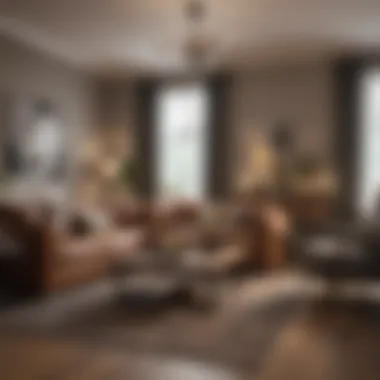
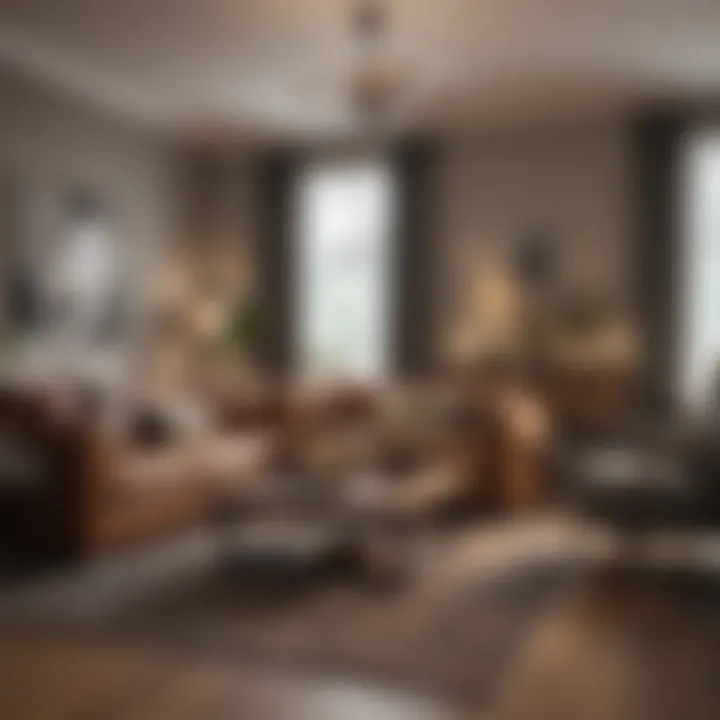
One downside? The right cutlery can be a bit pricey, but think of it as long-term savings— a well-made knife set will last you years.
Measuring Tools
When it comes to measuring tools, precision is the name of the game. Sturdy measuring cups and spoons will help you avoid the dreaded scenario of adding a cup of salt instead of sugar into that chocolate cake. A good kitchen scale can also be invaluable, especially for baking, where the balance of ingredients is crucial.
The unique feature of modern measuring tools is often the incorporation of digital display units, making them super easy to read. In a world where time flies, having tools that simplify the process can’t be overstated.
Appliances for Daily Use
Microwave, Toaster, and Blender
Let’s not skip over the appliances; essentials like the microwave, toaster, and blender can significantly impact your kitchen experience. A microwave is life-changing for reheating leftovers or defrosting meats in a pinch. Toasters, too, are often underrated, transforming simple bread into breakfast goodness.
The key characteristic of these small appliances is instant convenience. A blender easily expands your culinary horizons— think smoothies, soups, and sauces all whirling together in a matter of seconds.
However, on the flip side, it’s easy to overbuy. Pick versatile appliances that meet your specific needs rather than allowing every shiny gadget to catch your eye.
Coffee Maker Considerations
Ah, the coffee maker. For many, this appliance is the lifeblood of morning routines. A quality machine can brew a custom cup that matches your taste, whether it’s a daily boost or a weekend treat. The key characteristic of a good coffee maker is its brew strength and temperature control, which can elevate your coffee experience vastly.
When considering options, weigh the benefits of single-serve versus traditional drip coffee makers. While single-serve machines offer convenience, they can lead to higher running costs over time.
Refrigerator Must-Haves
Your refrigerator holds it all together. Beyond just storing food, a refrigerator can help you keep your grocery budget on track. When it comes to refrigerator must-haves, look for models with adjustable shelves and energy efficiency ratings. Key features can include built-in ice makers or water dispensers, both of which add a touch of convenience.
Remember, a good fridge helps keep food fresher for longer, which means fewer grocery trips and less waste—a win-win.
Food Storage Solutions
Containers for Leftovers
Once you dive into cooking, the need for containers for leftovers becomes apparent. Key characteristics of quality leftover containers often include airtight seals and microwave-safe materials. This means your delicious Monday casserole can still taste good by the time Friday comes around without unwanted freezer burn ruining the flavor.
One unique feature of reusable containers is that they come in a variety of shapes and sizes, allowing you to fit them snugly in your refrigerator. Another perk is that they help you contribute less to plastic waste, as they can be reused multiple times.
Pantry Storage Options
Good pantry storage options can save your sanity. From canisters for flour and sugar to baskets for snacks, organized storage keeps your culinary experiments running smoothly. Key characteristics include durability and stackable designs that make good use of vertical space. A well-organized pantry can also stimulate creativity, making it easier to see all the ingredients at your disposal.
Be cautious of containers that aren’t airtight. They might look good, but stale cooking ingredients don’t bring joy, let alone good meals.
Freezer Organization
When it comes to freezing leftovers or bulk cooking, solid freezer organization becomes crucial. A well-organized freezer means easy access to frozen meals without needing to dig through an avalanche of old food. Key characteristics include clear storage bins and labeled bags. You’ll appreciate knowing what's what, especially when you're in a rush.
One disadvantage, though: if you’re not careful, frozen meals can be forgotten, so regular rotation is a must to avoid waste.
Conclusion on Kitchen Necessities: Getting the right kitchen necessities doesn’t just facilitate cooking; they can elevate your entire lifestyle. From smart pots to robust appliances, a well-thought-out kitchen layout prepares you for memorable meals and effortless entertaining.
Ultimately, investing time and thought into your kitchen essentials means you're one step closer to mastering your home cooking experience.
Living Room Essentials
Setting up your living room is like laying the groundwork for a cozy, inviting haven where memories are made. This area often serves as the social nucleus of your home. Therefore, it’s essential to get the elements right from the get-go. The right combination of furniture, decor, and lighting can transform a stark room into a personalized sanctuary that feels both welcoming and functional. Think of it as the heart of your apartment—it should reflect your style and provide comfort and utility for you and your guests.
Furniture Selections
Choosing the Right Sofa
When picking a sofa, it’s more than just finding something comfy. The sofa essentially sets the tone of the living room. Ideally, you'd want one that balances both aesthetics and comfort. Size is crucial; a sofa that’s too large can make your space feel cramped. Conversely, a smaller sofa may lack the impact you desire. A sectional, for example, might be perfect for seating groups, making it a beneficial choice for entertaining.
Moreover, the cover material plays a central role—something like a durable fabric can resist the wear and tear of daily use while enhancing its longevity. A unique feature, such as a convertible sofa, takes versatility to a new level by functioning as a bed for guests. Nevertheless, be aware that while they offer flexibility, they often sacrifice some comfort for function.
Coffee Tables and Side Tables
Coffee tables serve as both a functional surface and a design statement. A well-chosen coffee table can anchor your room, creating a focal point. You might consider styles that mirror your own taste—be it sleek, modern glass or rustic wooden finishes. Also, think about functionality. A table with storage can help declutter your living space. However, watch out for overly bulky designs that might cramp the flow of the room. Side tables are also vital; they provide convenient surfaces for placing drinks, books, or decor.
Entertainment Units
An entertainment unit is not just for electronics; it also offers a chance to display your personality through decor. Functionality is vital here—having a unit that accommodates your TV while offering shelves for books or decor items is ideal. Open shelving can create a light, airy feel, whereas closed cupboards can help keep clutter out of sight—it's a balance that many look for. A unique characteristic of fashionable units today is the emphasis on modular design, allowing you to customize the arrangement to suit your needs. Still, keep in mind how easily accessible your media will be; some designs might look pretty but hinder usability.
Decorative Elements
Rugs to Enhance Comfort
A well-placed rug can redefine a space. Comfort-wise, it adds a layer of coziness underfoot; this is especially crucial if you’re dealing with cold floors. Rugs can also bolster sound insulation, making your space feel warmer and quieter. Textures vary widely, from plush to flat weaves, adding depth and layers to your decor. Opting for a pattern that resonates with your personal style can tie the room together visually.
However, take note that rugs need regular upkeep. Dark colors might hide dirt better but could make a space feel heavy. On the other hand, light ones can brighten up a room but call for more frequent cleaning.
Wall Art and Accessories
Art does wonders in injecting personality into your living space. Variety is key; mixing different media—from paintings and photographs to sculptures—creates visual interest. Your art choices can function as conversation starters, enhancing your ability to engage guests.
Displaying personal creations or travel souvenirs instills a sense of individuality. However, be wary of overcrowding; too many pieces can lead to visual chaos. Choosing fewer, larger pieces can often make a more significant impact.


Lighting Solutions
Good lighting changes everything. Think of it as the icing on the cake; it highlights the beauty of your space. A mix of overhead lights and table lamps will ensure every corner is well-lit but also creates a motivating atmosphere in the evening.
Ambient lighting brings warmth, while task lighting is crucial for reading or working. Floor lamps can be a unique feature, offering flexibility in placement. Remember, soft lighting is generally more inviting than stark brightness; it helps create that cozy vibe everyone seeks in a living room.
"A well-decorated living room is like a warm hug—you know you’re always welcome to stay a while."
Bedroom Basics
Creating a peaceful and functional bedroom is essential for anyone transitioning into their first apartment. It’s more than just a place to sleep; it’s a personal sanctuary where every piece plays a significant role in comfort and style. When you invest time in selecting the right elements for your bedroom, you're not just filling a space; you're building a haven that reflects your personality while meeting your needs.
Prioritizing bedroom basics means considering everything from the bed to organizational solutions, all contributing to a restful environment. A well-thought-out bedroom setup not only enhances the aesthetics of the apartment but also promotes better sleep and wellbeing. Let's delve into the key components.
Bed and Bedding Choices
Mattress Types and Sizes
When it comes to mattresses, the choices can be overwhelming. Options like memory foam, innerspring, and latex each come with their own set of characteristics. Memory foam, for instance, offers excellent support and contouring, making it a popular choice. It tends to hug the body’s curves, providing pressure relief which is essential for a good night's sleep.
The size is also crucial. Common sizes like twin, full, queen, and king determine how much room you have to move around. A queen-sized mattress is often considered the "goldilocks" size, offering ample space for comfort without overwhelming a smaller room. The downside? It can be a bit trickier to transport. In summary, a mattress that fits your body type and preferences can drastically improve your quality of sleep.
Pillows and Linens
Choosing the right pillows and linens is just as vital as selecting a mattress. Pillows come in various materials, like down feathers or synthetic fills, with each option catering to different sleep styles—back, side, or stomach. For instance, side sleepers may benefit from firmer and thicker pillows to maintain spinal alignment.
As for linens, the fabric plays a big role in your bedroom's comfort level. Cotton sheets are widely favored for their breathability and softness, yet microfiber options are gaining traction due to their easy maintenance and affordability. A well-chosen pillow and set of linens not only enhance your sleeping experience but also add to the overall look of the bedroom.
Bed Frames and Support
A sturdy bed frame provides the foundation for your mattress and thus impacts your overall sleep quality. Bed frames come in various styles—platform, adjustable, or traditional. A platform frame supports the mattress well without needing a box spring, saving you money and space.
Additionally, a frame can add to the room's decor, acting as a statement piece whether it’s wood, metal, or upholstered. However, budget considerations come into play here. A good frame shouldn’t break the bank but investing in a reliable option pays off in the long run, reducing the risk of peeking issues with your mattress.
Storage and Organization
Closet Solutions
Closet space is often limited in apartments, making efficient closet solutions crucial. Organizers, hanging shelves, or even closet rods can maximize vertical space, ensuring a neat environment. An effective closet system caters to your storage needs, making it easier to find items and keeping clutter at bay.
Utilizing labeled bins or stylish storage boxes can even turn a boring closet into an aesthetically pleasing area while retaining functionality. Accessibility is a significant factor—having a well-organized closet can drastically reduce the time spent searching for clothing, contributing to a smoother morning routine.
Under-Bed Storage Ideas
Space-saving options are a must for smaller apartments, and under-bed storage serves this purpose perfectly. Rolling bins and flat plastic containers fit neatly under the bed, providing room for seasonal clothes, shoes, or even extra bedding. This often-overlooked space means you can keep your bedroom clutter-free without sacrificing essential items.
Using the under-bed area cleverly allows you to maximize your living space, which is especially valuable if you're working with tight quarters. It’s an ingenious way to keep your bedroom tidy and organized, elevating the entire vibe of your apartment.
Nightstands and Their Importance
A nightstand might seem like a minor addition, but it holds significant value in a bedroom. It acts as a convenient place for essentials like a lamp, books, or a glass of water. Besides function, nightstands can be design elements that complement your room's aesthetic.
Some come with drawers, providing extra storage for items you want nearby but hidden away. A well-chosen nightstand serves to unify your bedroom decor while helping keep bedtime necessities within reach. Whether opting for minimalist or ornate designs, ensuring that it suits both your style and needs is key.
In sum, a thoughtful selection of bedroom basics not only enhances comfort but also sets the tone for your entire apartment. Taking the time to evaluate what works best for you will lead to a space that is not just functional but also warm and inviting.
Personal Care and Maintenance
When it comes to creating a comfortable and functional living space, personal care and maintenance items are often overlooked. However, these essentials contribute to both your well-being and the upkeep of your new apartment. A clean and well-organized environment promotes mental clarity, reduces stress, and instills a sense of pride in your home. As a first-time renter, understanding the importance of personal care and regular maintenance can set the stage for a fulfilling independent living experience.
Bathroom Essentials
Towels and Linens
Towels and linens are fundamental components in any bathroom setup. Not only do they serve a practical purpose, but they also add a touch of comfort to your daily routine. Quality towels, made from absorbent materials like cotton, are soft against the skin and dry efficiently. Having a mix of bath towels, hand towels, and washcloths on hand is a commendable start.
Choosing sets that complement your bathroom's color scheme can elevate the overall aesthetic while being a beneficial choice for personal comfort. A unique feature of towels is their varied textures, which can enhance the drying experience.
However, it’s worth noting that cheaper towels may not be as durable, fading or losing absorbency over time. Investing in good-quality linens pays off in the long run; they last longer and continue to provide comfort.
Personal Hygiene Items
Personal hygiene items, such as soap, shampoo, toothpaste, and deodorants, are indispensable in maintaining good health and hygiene. These products are tailored to suit individual needs and preferences and are essential to daily routines. A key characteristic of personal hygiene items is their necessity and the wide range of options available.
For instance, you might opt for organic soaps over regular ones to avoid harsh chemicals. This choice serves the dual purpose of being a healthier alternative while also being skin-friendly. Also, organizing these items in a designated space, like a bathroom drawer or shelf, can streamline your daily routine.
On the downside, the sheer volume of products on the market may make it harder to choose what's right for you. It’s a journey of exploration to find the perfect fit, but this customization assures that you are taking care of your well-being adequately.
Cleaning Supplies for Routine Maintenance
Cleaning supplies are vital for maintaining a hygienic home. They include items like all-purpose cleaners, sponges, brooms, and mops, which are essential for keeping both the bathroom and other parts of your apartment in tip-top shape. The characteristic of cleaning supplies is their ability to make mundane tasks more manageable, providing tools that help you maintain cleanliness without much effort.
For example, a good multi-surface cleaner can save time and effort, allowing you to tackle different surfaces with ease. Specialized products, such as tile cleaners or disinfectants, can also promote a healthy living environment by reducing bacteria and germs.
However, one must be cautious. Sometimes, cheaper cleaning products can be ineffective, meaning you may need to use more to achieve the desired level of cleanliness. Therefore, investing in quality cleaning supplies might be more economical in the long run as they often yield better results.
Safety and Security Items
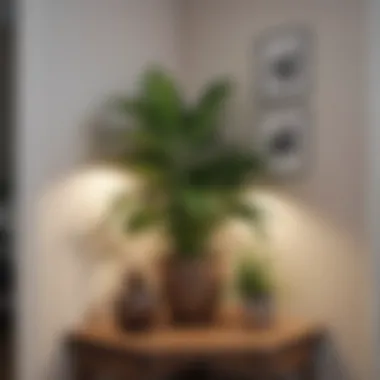

First Aid Kits
Every apartment should have a first aid kit readily available. Injuries and mishaps can occur anytime, and having essential supplies like band-aids, antiseptic wipes, and gauze can be lifesavers. First aid kits not only provide care in emergencies but also promote peace of mind knowing you are prepared.
One significant aspect of a first aid kit is its portability; it can easily be stored in a bathroom cabinet or a kitchen drawer, making it accessible when you need it. The unique feature of these kits is the ability to customize them based on your particular needs, making them a personal and practical choice.
That said, one must remember to frequently check and restock the supplies if used. Leaving outdated items in the kit could do more harm than good in an emergency situation.
Fire Extinguishers
A fire extinguisher is crucial for safety in an apartment. Fire hazards can arise from various sources, such as the kitchen, so having an extinguisher can prevent minor fires from escalating into disasters. The distinctive feature of fire extinguishers is their capacity to quickly douse flames and potentially save lives.
If you have a small space, opting for a compact model can ensure it doesn’t disrupt your décor while remaining effective. However, it’s crucial to know how to use it properly, as an improperly used extinguisher could be ineffective. Training yourself in its operation adds value to this essential item in an apartment setting.
Locks and Security Systems
Locks and security systems play a pivotal role in ensuring your safety. They are the frontline defense against unauthorized access and provide the necessary security in your living space. The fundamental aspect of locks is their capability to deter unwanted entry while providing peace of mind.
A unique feature of modern security systems is the integration of smart technology, allowing you to monitor your home remotely. While these systems often come with added costs, the benefits of enhanced security and the possibility of lower insurance premiums may justify that investment. However, an overdependence on technology can lead to vulnerabilities if systems fail or batteries die, necessitating back-up traditional measures too.
Personalization and Final Touches
Creating an apartment that feels like home is about more than just the basic furniture and appliances. Personalization and final touches breathe life into what could feel like a sterile space. These elements allow you to express your individuality and style, turning a mere living space into a sanctuary that resonates with who you are.
Being intentional about how you incorporate your personal flair can elevate the atmosphere, making your apartment not only livable but distinctly yours. Personalization helps you establish a sense of comfort and joy in your surroundings. From selecting hues that evoke certain feelings to surrounding yourself with pieces that tell your story, every choice contributes to the character of your home.
Incorporating Personal Style
Choosing a Color Palette
When it comes to Choosing a Color Palette, understanding the psychology of color can play a vital role. Colors not only affect mood but also influence how spacious or cozy a room may feel. For instance, soft blues can create a calming space, while warmer hues like yellow and orange can inject vibrancy and energy.
One key characteristic of selecting a color palette is its ability to unify your different decor pieces. Choosing a cohesive scheme ensures that even various styles can harmonize beautifully in a room.
However, careful thought is required, as some colors can overwhelm a space if overused. It's best to balance bolder accents with neutral tones to avoid a chaotic feel.
Displaying Personal Artwork
Displaying Personal Artwork is a perfect way to add depth and warmth to your apartment. Not only does it showcase your interests and tastes, but it also turns bare walls into an expression of personal narrative. Each piece can serve as an aesthetic anchor that ties a room together while sparking conversation.
One appealing aspect of showcasing art is that it allows flexibility. Whether you prefer a sleek gallery wall or a more eclectic display, how you arrange your artwork can reflect different styles and moods. However, it’s important to be mindful of the sizes, as mismatched proportions can create visual imbalance in a room.
Arranging Plants and Greenery
Arranging Plants and Greenery is another essential touch that brings life and energy into any apartment. Plants can add pops of color and texture, enhance air quality, and even improve your mood. Plus, they have a charming way of softening hard edges typically found in furniture and architecture.
The beauty of incorporating plants lies in their versatility. From small succulents perched on a windowsill to larger leafy friends gracing a corner, the options are abundant. However, be mindful of the care needs of each variety, as not all plants thrive in the same conditions.
Creating a Welcoming Atmosphere
Scented Candles and Diffusers
Scented Candles and Diffusers are not just decorative items; they have the power to transform your space by creating a specific ambiance. Certain fragrances can calm nerves, energize, or even evoke memories. Placing them around your apartment can significantly enhance how inviting your home feels.
They're popular choices in decor because scents often linger, providing a subtle yet effective way to evoke a sense of belonging. However, a key consideration is to select scents that complement each other rather than competing for attention, as this can create an overwhelming atmosphere.
Soft Textiles and Throws
Incorporating Soft Textiles and Throws adds an element of comfort and warmth that invites you to snuggle in. Whether it’s a cozy throw draped over a sofa or a plush rug underfoot, textiles can soften a room and add layers of texture.
These materials are beloved for their tactile qualities and ability to enhance relaxation. Still, striking the right balance is vital—too many textiles can lead to clutter instead of comfort, so it's best to curate a few standout pieces that truly resonate.
Utilizing Ambient Lighting
Finally, Utilizing Ambient Lighting sets the mood and tone of your space more than you might realize. The right lighting can transform the most mundane of areas into a warm and inviting sanctuary. Incorporating a variety of sources, such as lamps, string lights, and dimmers, allows flexibility in adjusting the atmosphere as needed.
This choice is particularly beneficial for evening relaxation or entertaining guests, as soft lighting tends to foster a warm vibe. Yet, one must consider the functional aspects, ensuring that areas requiring brighter light aren’t neglected.
Embracing personalization and thoughtfully selecting final touches can change how you perceive the space around you, making it feel more like home.
In summary, your first apartment is a blank canvas just waiting for your brush. Personalizing your space thoughtfully can create a haven tailored just for you. Each choice—from colors to plants, textiles to lights—paints a picture of your life, crafting an environment that welcomes you as you walk through the door. It's these details, these final touches, that make the difference.
Epilogue and Moving Forward
As you settle into your first apartment, it's vital to take a step back and contemplate what your new space means for you. This transition is not merely a change of address; it's the initiation of a significant new chapter in your life. A well-thought-out approach to your living environment can yield benefits that extend beyond mere aesthetics. Your apartment should resonate with your personality and provide comfort, function, and inspiration.
Reflecting on Your New Space
Reflecting on your new space involves more than just a quick glance around. You have the chance to assess how the layout and decor foster your daily activities and support your lifestyle. Take the time to notice how the space feels—does it encourage relaxation, creativity, or productivity? Recognizing the various aspects of your environment can guide you to make informed decisions on potential tweaks or changes.
- Evaluate your emotional response: Does the arrangement give you positive vibes or leave you feeling a bit confined?
- Identify functionality: Are your essential items easily accessible? Can you move smoothly from one area to another?
- Consider future possibilities: This is just the beginning. Envision how this space can evolve as you grow.
The process of reflecting allows you to curate a living experience tailored to your preferences. Who knows? After addressing immediate needs, you might discover a desire to experiment with decor or even take on minor renovations.
"Home is not just a place; it's a feeling."
Tips for Future Home Improvement Projects
Looking ahead, it's prudent to consider what may enhance your apartment. After all, living spaces are often a work in progress, and there’s always room for improvement. Here are several strategies for future projects:
- Prioritize repairs: Don't delay fixing any issues like leaks or damages. Addressing these promptly can save you money in the long run.
- Invest in quality over quantity: When considering new purchases, focus on investing in fewer, higher-quality items that will last and serve multiple purposes.
- Plan for seasonal changes: Think about how your needs might shift with the seasons. You may want thicker curtains in winter or outdoor furniture in summer.
- Involve your neighbors: Building connections can lead to resource sharing for improvement projects. A kind neighbor may lend tools or offer advice on DIY tasks.
- Stay organized: Create a home improvement calendar to manage tasks, ensuring you don't bite off more than you can chew at once.
These preparations promote a cohesive living experience and make your space continuously enjoyable.
Reflecting and planning can turn your apartment into not just a place to live but a personal sanctuary tailored to your preferences and lifestyle choices.







